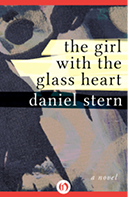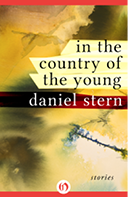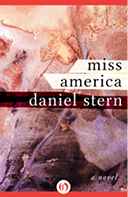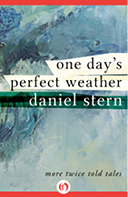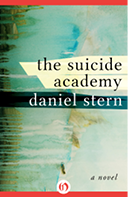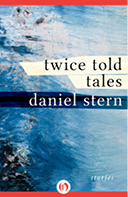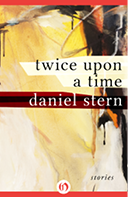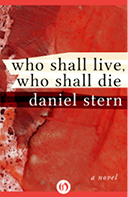Twice Told Tales (19 page)
Authors: Daniel Stern
“It’s okay,” Lew muttered to the astonished young woman attendant. “This man’s kid used to live here.” From the inside looking out they surveyed the debris of their lives. The coat room was three times the size it had been in the Grand Old Period. Lew lay down on the floor, embedded in some of the light topcoats of the season, remembering, aloud, Krasner’s moment of dramatic intervention, Tulip’s momentous diarrhea.
Drunk and sad, Jackson Eudemie lay down next to Lew. The events of the day made him think of his children’s book on Freud, which was, as usual, late. It was a small jump from Lew’s mumbled memories to thinking about Freud—the Freud of 1887, turning from the bizarre and terrifying discoveries of hysterical, often paralyzed women delivering up the dark twisted truths they’d spent their lives, their balance, their physical health trying to suppress. He thought of that self-named conquistadore turning from this exotic jungle to the still unexplored jungle of the every day: the tongue slipping into the repressed expressed wish … the umbrella forgotten on a rainy day summing up a life of denial …
The Psychopathology of Everyday Life!
In his silly little children’s book he would describe to the young people of the world how the ambitiousness of the title went unnoticed in its familiarity. He thought of Lew Krale drinking himself out of business saved by Tulip, growing old crucified by success; of Krasner lurking in the forest of his shyness and ego, a hero waiting to happen to his own drama. All of these and most of all of his first wife, Katherine Eudemie. She’d come to New York to be a writer like Lionel Trilling, Delmore Schwartz, Bernard Malamud—the great shadow-Jews of her Midwest imagination. She’d come to contribute and willy-nilly she will have contributed.
She’d come to New York for grandeur and forgot what she came for. Parapraxis Found was her most lasting work and she’d ended up helping to save Lew Krale’s dying restaurant … had written, instead of the Great Jewish/Goyish Novel, a chapter in the history of a café; the Necessary Place, where those with a song to sing rest their voices in gossip and laughter. It was the dream of artistic achievement writ small, not in ink but in caviar and canapés.
Thus go most dreams when they encounter the Psychopathology of Everyday Life. Remembering all this he began to laugh not unkindly and Lew joined in with a loose, wet laugh, creating the kind of ruckus the place had not heard or seen in years.
“How’d you get home?” Myrna said.
“Lew lent me some money. It was like the old days. Go to sleep.”
But before they slept he told her about the crazy evening. He left out the cemetery part; told her everything else, though, including the drunken sprawl with Lew Krale in the hat check room. He felt old and happy and unreasonably pleased with the past.
“I hope Tulip appreciates being pregnant,” Myrna said. “I wanted that so much.”
“Yes. Everything begins in passion and hunger,” Jackson Eudemie said.
“I was never a mother and now I’m going to be a grandmother,” Myrna murmured. “Everything ends in comedy,” she said and went back to sleep.
Daniel Stern (1928–2007) was an American novelist and scholar. Raised in
New York City
, he was an accomplished cellist and promising composer before he began his writing career. After graduating from the High School of Music and Art in New York, he earned positions with the Indianapolis Symphony Orchestra and the Houston Symphony and played with renowned jazz musician Charlie Parker. He also served as the vice president of major media companies including Warner Bros. and CBS. In addition to publishing nine novels and three collections of short fiction, Stern also served as the editor of
Hampton Shorts
. As an author, Stern is celebrated for his explorations of post–World War II Jewish-American life; his novels’ formal experimentation; and, in the short-story genre, his innovation of the “twice-told tale.”
His writing won many awards throughout his career, including the International Prix du Souvenir from the Bergen Belsen Society and the French government; the Rosenthal Award from the American Academy of Arts and Letters; two Pushcart Prizes; two O. Henry Awards; and the honor of publication in
The Best American Short Stories
. In addition to serving on the faculty of the University of Houston’s creative writing program, he taught at Wesleyan, Pace, New York, and Harvard Universities.
All rights reserved, including without limitation the right to reproduce this ebook or any portion thereof in any form or by any means, whether electronic or mechanical, now known or hereinafter invented, without the express written permission of the publisher.
This is a work of fiction. Names, characters, places, events, and incidents either are the product of the author’s imagination or are used fictitiously. Any resemblance to actual persons, living or dead, businesses, companies, events, or locales is entirely coincidental.
“The Liberal Imagination by Lionel Trilling: a Story” was first published in the magazine
New Letters.
“The Interpretation of Dreams by Sigmund Freud: a Story” was first published in
The Ontario Review
and was included in
O. Henry Prize Stories: 1987, The Best American Short Stories: 1987,
and
The Ways We Live Now: Contemporary Short Fiction from The Ontario Review.
“Brooksmith by Henry James: a Story” was first published in the magazine
Raritan.
“The Psychopathology of Everyday Life by Sigmund Freud: a Story” was first published in
The Paris Review.
Copyright © 1989 by Daniel Stern
Cover design by Mauricio Diaz
978-1-4804-4422-5
This edition published in 2013 by Open Road Integrated Media, Inc.
345 Hudson Street
New York, NY 10014


